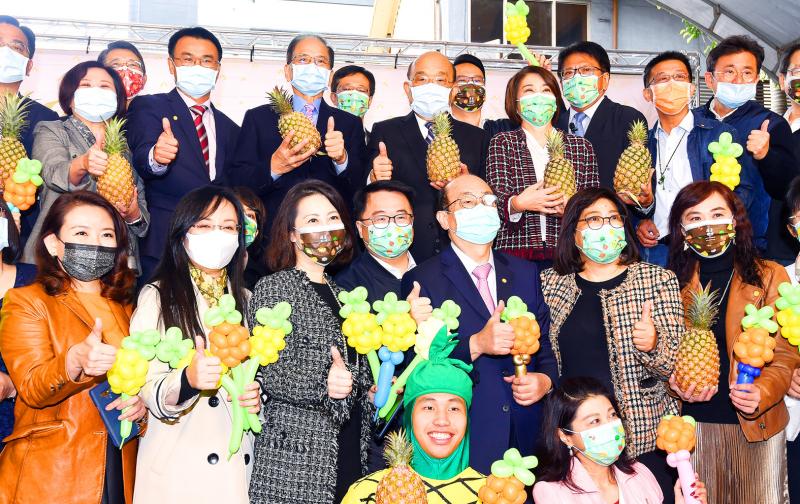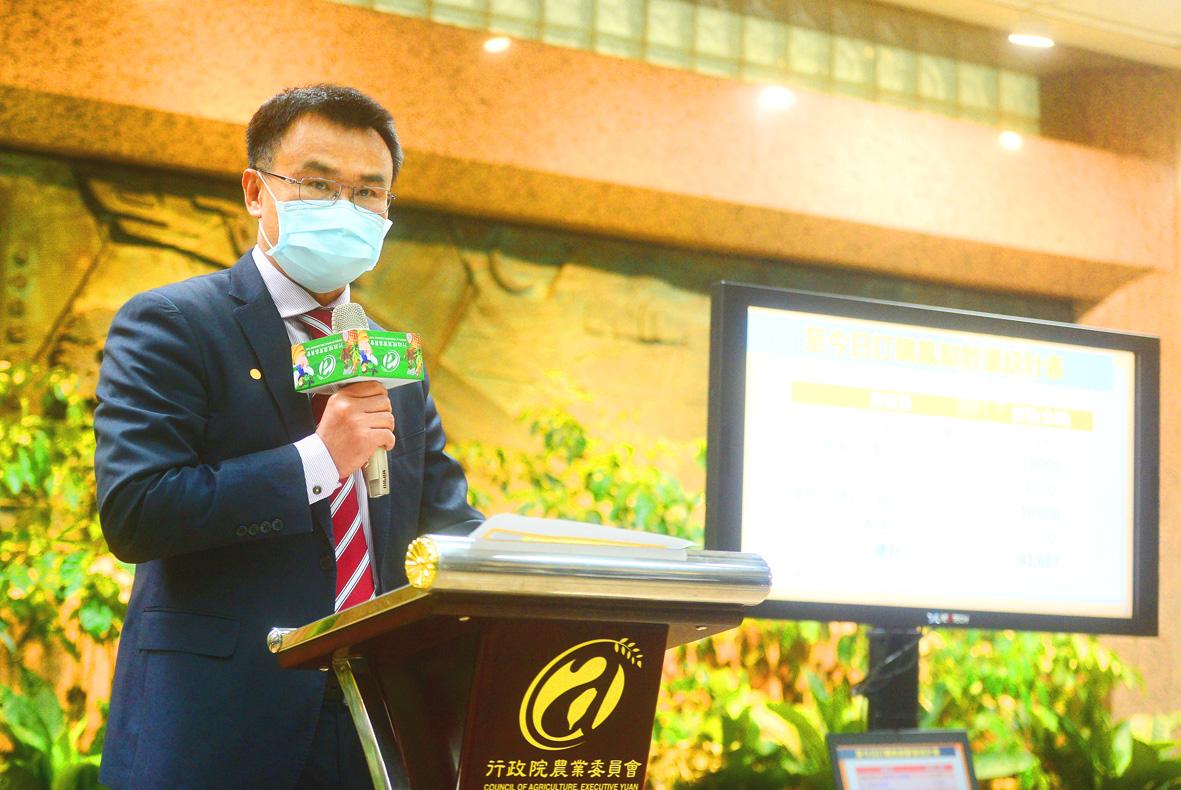A joint effort by groups and individuals in Taiwan and abroad to prop up sales of pineapples after China announced a ban on imports of the fruit succeeded in just four days, the Council of Agriculture (COA) said yesterday.
China on Friday announced that it would suspend imports of Taiwanese pineapples starting on Monday, citing biosafety concerns.
Following the announcement, the council urged the public to assist farmers by purchasing pineapples, saying it hoped to sell 20,000 tonnes of the fruit domestically and 30,000 tonnes in exports.

Photo: Liao Chen-huei, Taipei Times
“Domestic orders have already surpassed the total sold to China last year,” COA Minister Chen Chi-chung (陳吉仲) said, after announcing a total of 41,687 tonnes in domestic orders over the past four days.
The council had initially planned to boost domestic sales by pushing for the purchase of 20,000 tonnes of processed pineapples for use in various food products, but orders exceeded expectations following an outpouring of support from individuals, companies and activist groups.
More than 180 companies ordered 7,187 tonnes of whole pineapples; 19 companies ordered 15,000 tonnes of processed pineapples; 14 beverage shops ordered 4,500 tonnes; wholesalers and street market vendors ordered 10,000 tonnes; and exporters and overseas groups ordered 5,000 tonnes, the council said.

Photo: Wang Yi-sung, Taipei Times
“We are also looking at boosting exports to countries other than China. Last year, we sold US$131 million of fruit to China and US$52 million to all other countries combined,” Chen said.
At 71 percent of total fruit exports, sales to China last year dropped slightly from 2016, when 77 percent of Taiwan’s fruit exports went to China, he said.
Meanwhile, the Canadian and US representative offices in Taipei on Monday posted messages on social media with the tag #FreedomPineapple, and called on people to support Taiwan’s pineapple growers.
The Canadian Trade Office in Taipei (CTOT) posted a photograph on Facebook of staff members standing around two Hawaiian pizzas with the message: “At CTOT we love pineapples on our pizza, especially Taiwanese pineapples!”
The post says Hawaiian pizza is a Canadian invention, first made in 1962 by Canadian chef Sam Panopoulos at his restaurant in Chatham, Ontario.
Democratic Progressive Party Legislator Karen Yu (余宛如) commented on the post, thanking the CTOT for its support.
“Taiwanese pineapples have the taste of freedom. I believe you will enjoy them,” she wrote.
Additional reporting by Lu Yi-hsuan

GAINING STEAM: The scheme initially failed to gather much attention, with only 188 cards issued in its first year, but gained popularity amid the COVID-19 pandemic Applications for the Employment Gold Card have increased in the past few years, with the card having been issued to a total of 13,191 people from 101 countries since its introduction in 2018, the National Development Council (NDC) said yesterday. Those who have received the card have included celebrities, such as former NBA star Dwight Howard and Australian-South Korean cheerleader Dahye Lee, the NDC said. The four-in-one Employment Gold Card combines a work permit, resident visa, Alien Resident Certificate (ARC) and re-entry permit. It was first introduced in February 2018 through the Act Governing Recruitment and Employment of Foreign Professionals (外國專業人才延攬及雇用法),

RESILIENCE: Deepening bilateral cooperation would extend the peace sustained over the 45 years since the Taiwan Relations Act, Greene said Taiwan-US relations are built on deep economic ties and shared values, American Institute in Taiwan (AIT) Director Raymond Greene said yesterday, adding that strengthening supply chain security in critical industries, enhancing societal resilience through cooperation and deepening partnerships are key to ensuring peace and stability for Taiwan in the years ahead. Greene made the remarks at the National Security Youth Forum, organized by National Taiwan University’s National Security and Strategy Studies Institution in Taipei. In his address in Mandarin Chinese, Greene said the Taiwan-US relationship is built on deep economic ties and shared interests, and grows stronger through the enduring friendship between

CAUTION URGED: Xiaohongshu and Douyin — the Chinese version of TikTok — are tools the Chinese government uses for its ‘united front’ propaganda, the MAC said Mainland Affairs Council (MAC) Minister Chiu Chui-cheng (邱垂正) yesterday urged people who use Chinese social media platforms to be cautious of being influenced by Beijing’s “united front” propaganda and undermining Taiwan’s sovereignty. Chiu made the remarks in response to queries about Chinese academic Zhang Weiwei (張維為) saying that as young Taiwanese are fond of interacting on Chinese app Xiaohongshu (小紅書, known as RedNote in English), “after unification with China, it would be easier to govern Taiwan than Hong Kong.” Zhang is professor of international relations at Shanghai’s Fudan University and director of its China Institute. When giving a speech at China’s Wuhan

ENHANCE DETERRENCE: Taiwan has to display ‘fierce resolve’ to defend itself for China to understand that the costs of war outweigh potential gains, Koo said Taiwan’s armed forces must reach a high level of combat readiness by 2027 to effectively deter a potential Chinese invasion, Minister of National Defense Wellington Koo (顧立雄) said in an interview with the Chinese-language Liberty Times (sister newspaper of the Taipei Times) published yesterday. His comments came three days after US Secretary of State Marco Rubio told the US Senate that deterring a Chinese attack on Taiwan requires making a conflict “cost more than what it’s worth.” Rubio made the remarks in response to a question about US policy on Taiwan’s defense from Republican Senator John Cornyn, who said that Chinese